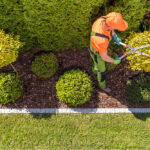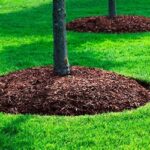Most Minnesota property owners will do whatever it takes to have a lush, green lawn.
They may not be interested in the supporting cast, the trees, shrubs, and flowers that most people love. Yet, they are emphatic about having a lush, green, well-manicured lawn that stands out.
Lawns Are The Landscape Element Everyone Understands
Neglecting the lawn is the surest way to make outstanding landscapes look average. These green spaces are the frame that lifts up and supports the entire outdoor living space year-round.
Professionals agree it’s easy to have a lush green lawn in the springtime when conditions are ideal. But what about the mid-summer days when you are most likely to host guests?
We’ve compiled the top tips professionals rely on to keep Minnesota properties looking their best. These will give any lawn a quick boost with sustainable health and vigor as the practices are repeated.
You will be fascinated by how quickly these tips will work, and how much time and money they will save for years to come.

Minnesota Lawn Care & Landscaping Services | Green Grounds Landscaping
#1. Prioritize Healthy Natural Water
Water is a valuable resource that should be carefully managed. Odds are you are paying for it too if your home is located within an urban or suburban community.
That alone should be enough to motivate people to manage their use of irrigated water. As water resources across the United States are further depleted, it stands to reason that the price of water will increase to discourage wasting it.
One of the most frustrating experiences for lawn and landscape pros is witnessing irrigation systems operating during or immediately after a storm.
Storms produce plentiful nitrogen in a natural form. You will notice its greening effect almost immediately, and its benefit is sustainable too. Knowing this, you would think property owners would go to great lengths to avoid washing this benefit away with irrigated water.
Too much water also limits every plant’s ability to access oxygen from the air. Oxygen is a necessary part of the photosynthesis process, and without it, plants will rapidly decline and eventually die. This is true even for the toughest varieties of turfgrass.
Related article: Installing Artificial Turf: Can I Do It By Myself?
#2. Leave Grass Clippings And Leaves
When you leave grass clippings to work their way back into the soil, you are returning organic matter and needed moisture. Not only that, the clippings serve as a mulch that retains moisture already in the soil. Grass clippings are rich in nitrogen and potassium, both necessary elements for lush, green grass.
As a complement to this, try to mulch at least some fallen autumn leaves back into the soil. Now you are returning carbon to the soil. It’s a valuable energy source for microbial growth that breaks down organic matter to make it available for turf and other plantings.
It’s interesting to note the future of lawn mowing is robotic mowers, and all the current brands dispose of grass clippings by micro-cutting, making them practically invisible.
#3. Rejuvenate Turf With Fresh Soil
Rich organic matter feeds turfgrass in ways that only Mother Nature can. More than natural fertilizer, topdressing lawns with a thin layer of topsoil adds microorganisms that work tirelessly to create a symbiotic environment for root systems to flourish.
It encourages natural chemistry that facilitates air, water, and nutrients working together as one.
Many lawns are depleted of organic matter. This is mostly due to chemical fertilizer and weed control applications, which of course, are necessary treatments. Thus, it’s an inevitable outcome that must eventually be addressed. Although, most homeowners are not aware of this.
Related article: Pre-Emergent Weed Control: 5 Things You Need to Know About It
Depending on the size of your lawn, you may wish to hire a landscape company in Minnesota to perform this service for you.
You could also break it down into smaller projects, such as the front yard one season and the back the following year.
Finally, if you have especially problematic turf areas, you may wish to forego soil topdressing and simply replace the troublesome grass with fresh sod. The reason for this is fresh sod contains sufficient rich soil that eliminates the need to add new topsoil.

Minnesota Lawn Care & Landscaping Services | Green Grounds Landscaping
#4. Alternate Mowing Patterns
It doesn’t matter if the mower is small or large, its weight will weigh on the turfgrass it cuts and the soil beneath it. When the mowing pattern is the same every week, ruts will develop. They may not be noticeable, but they nevertheless affect the health of the lawn.
Whereas, if you alternate mowing patterns, you are giving the soil and blades of grass the opportunity to heal. The soil will loosen and the bending of the blades of grass in a new direction will allow light and moisture to enter the root system more freely.
The most common approach to mowing patterns is alternating a quarter rotation every week. Starting with vertical, then right and left diagonal, and then horizontal.
You’ll only have to determine how you handle that extra week in months with nearly five weeks.
#5. Aerate And Overseed In The Fall
Most homeowners are familiar with core aeration. It’s a practice best performed when temperatures break in the fall here in Minnesota. The cooler temperatures are ideal for aeration cores to break down and protect grass seeds as they prepare to sprout.
Established root systems also benefit from the coring process that prunes tired root systems to encourage new growth.
Overseeding commercial and residential lawns immediately after core aeration is a neat little secret. Grass seeds will fall into the loosened soil pockets where they will soon be protected by disintegrating soil cores as they work their way back into the ground.
In addition to rejuvenating barren turf areas, overseeding is valuable for introducing new and improved turfgrass cultivars that are more resistant to common diseases.
You can also introduce new varieties to manage other conditions, such as drought tolerance.
Related article: Fall Lawn Care Checklist for Minnesota
Green Grounds Landscaping: Helping Minnesota Homeowners Enjoy Outdoor Living
All of these professional tips will give you a more attractive and healthier green lawn. Some of them require greater effort or cost, but they all promise results.
Combining several of these may be the best approach to maximizing your results.
Our top priority at Green Grounds Landscaping is creating living spaces that are right for you. We pride ourselves on working with you from concept to construction to create the right landscape for your needs.
Contact us today for a free consultation to explore your next landscaping project.









